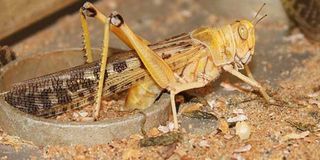Study shows eating desert locusts could help lower risk of heart disease

A desert locust. New research indicates that eating desert locusts could help reduce the risk of heart disease. The insect contains a rich composition of compounds known as sterols which have cholesterol-lowering properties. PHOTO | STELLAR MURUMBA | NATION MEDIA GROUP
What you need to know:
- The study was conducted jointly by icipe, Jomo Kenyatta University of Agriculture and Technology and the United States Department of Agriculture/Agricultural Research Service (USDA/ARS).
- Desert locust, scientifically known as Schistocerca gregaria, contains a rich composition of compounds known as sterols, which in turn have cholesterol-lowering properties.
- Although vegetables are generally the richest sources of phytosterols, insects have the potential to supply these useful compounds to people.
- The findings by icipe, JKUAT and USDA/ARS are redeeming for the desert locust, which is probably more reputed for its alarming threat to food security.
Eating desert locusts could help reduce the risk of getting heart diseases, a study has shown.
The study conducted as part of International Centre of insect Physiology and Ecology’s (Icipe) new Insects for Food and Feed initiative has revealed eating locusts could be good for your heart.
The study was conducted jointly by icipe, Jomo Kenyatta University of Agriculture and Technology and the United States Department of Agriculture/Agricultural Research Service (USDA/ARS).
The researchers show that meat from the desert locust, scientifically known as Schistocerca gregaria, contains a rich composition of compounds known as sterols, which in turn have cholesterol-lowering properties, which can help reduce the risk of heart disease.
According to Prof Baldwyn Torto of Icipe, sterols occur naturally in plants, animals and fungi.
Sterols from plants are known as phytosterols while those from animals are known as zoosterols.
Cholesterol is the most common type of animal sterol.
While phytosterols and cholesterol have a common characteristic of getting absorbed in the intestines, phytosterols have been shown to have a competitive advantage as they are able to block the absorption of cholesterol, says Prof Torto.
Although vegetables are generally the richest sources of phytosterols, insects have the potential to supply these useful compounds to people.
“In our study we found that, as is the case in other insects, cholesterol is the major tissue sterol in desert locusts.
“However, we observed that after the desert locust has fed on a vegetative diet, most of the common phytosterols are amplified and new ones are also produced in its tissues.
“In turn, this leads to a high phytosterol content, which suggests that eating desert locusts could reduce cholesterol levels,” explains Prof Torto.
STUDY PUBLISHED IN JOURNAL
The study was published on May 13, 2015 in PLOS ONE journal.
“Aside from cardiovascular protective effects, we also found the desert locust to have a wealth of other nutrients, including proteins, fatty acids and minerals, which are beneficial for anti-inflammatory, anticancer and immune regulatory effects.
“As such, the desert locust is an excellent source of dietary components for both humans and animals,” Prof Torto adds.
The findings by icipe, JKUAT and USDA/ARS are redeeming for the desert locust, which is probably more reputed for its alarming threat to food security.
Locust invasions experienced in the Sahel region of Africa have been known to destroy a lot of crops, leaving hunger and poverty in their wake.
“We hope that our findings will refocus the research on the desert locust in a new emerging dimension – its potential as a component in food and nutritional security in Africa.
“Despite its negative image, the desert locust is already consumed in many regions in Africa and Asia.
“As icipe has proven over the years, the desert locust is extremely easy to rear, meaning that it could either be domesticated on small-scale, or even produced through commercial ventures,” affirms Prof Torto.





